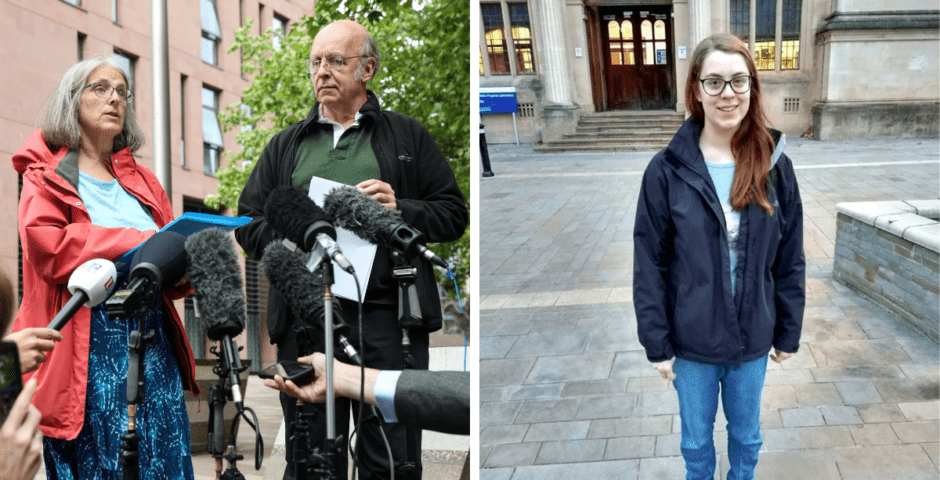
Natasha Abrahart’s parents say Bristol Uni ‘dragging out legal process’ instead of learning
The university has requested permission to appeal the decision that found its actions led to her tragic death
Natasha Abrahart’s parents have accused the University of Bristol of “dragging out this painful legal process” when they should instead be “focusing on keeping students safe” after the university decided last week to request permission to appeal the decision which found its actions led to the late student’s death.
Last month, Natasha’s parents, Bob and Margaret, won a legal case which found the university had breached the Equality Act 2010 in the way it treated second year physics student, Natasha.
Natasha died by suicide in April 2018. The 20-year-old had been diagnosed with chronic Social Anxiety Disorder and was found dead on the day she was meant to give a presentation in front of her classmates.

Natasha Abrahart’s parents, Bob and Margaret, outside Bristol County Court last month Credit: SWNS
Retired university lecturer, Bob, said: “It’s been a month since we called on the university to sit down with us so we could help it make the changes needed to keep students safe. We are deeply disappointed that the university is instead trying to re-run arguments which failed at trial.”
A spokesperson for the University of Bristol said the university has not yet decided whether it will appeal the ruling and that its decision is a “procedural step” towards submitting any future appeal.

Margaret, Bob and Natasha Abrahart Credit: SWNS
Margaret called on the university to apologise for its actions and learn lessons from her daughter’s death.
“How much longer will we have to wait before the university apologises for what happened to Natasha?” she said. “Even more importantly, how much longer is the university going to wait before implementing the lessons from Natasha’s death, which have been obvious for years now?”
She went on to say: “At the trial the university couldn’t point to one meaningful change it had made to the systems which failed our daughter. It should be focusing on keeping students safe instead of dragging out this painful legal process.”
Commenting on the details of the appeal request last week, Natasha’s parents said they were “shocked by the size of it.”
“I was expecting a couple of key points, not six pages of stuff. They still do not understand the Equality Act,” Bob said.

Credit: SWNS
Last month’s ruling at Bristol County Court found the university failed to make reasonable adjustments to the way it assessed Natasha. It engaged in indirect disability discrimination as Natasha was treated unfavourably due to the consequences of her Social Anxiety Disorder.
The university argued in court the “ability to explain and justify experimental work orally” is a key component to being a professional scientist in defence of her assessment to present in a 329-seat lecture theatre.
This argument was rejected by Judge Ralton. When delivering his verdict, he told the court: “It is obvious to me that the fundamental purpose of the assessments was to elicit from Natasha answers to questions put to her following the experiments.
“It is a statement of the obvious that such a process does not automatically require face to face oral interaction and there are other ways of achieving this.”
Ralton found that Natasha’s suffering was “serious” and “continuous” and ordered the university to pay the Abraharts £50,000 as well as 93 per cent of their legal costs.
Natasha was one of ten students at the University of Bristol known to have taken their own life during a two year period between 2016 and 2018.
A University of Bristol spokesperson said: “We have not yet decided whether we will be appealing the judgement or not. Seeking permission to appeal means we can appeal if we eventually decide to do so.
“Given the significant impact last month’s judgement in relation to the death of Natasha Abrahart could have on how all higher education providers support their students, we continue to review the decision carefully, including whether to appeal.
“We are fully committed to working with our partners in the NHS, charities and across the higher education sector in a collaborative effort to ensure we are collectively providing the best possible support for students in their studies. This commitment means we are continually reviewing and improving the pastoral support offered to our students.”
If you or someone you know has been affected by this story, please speak to someone or contact Samaritans on 116 123 at any time. You can contact Anxiety UK on 03444 775 774, Mind on 0300 123 3393, and Calm (Campaign against living miserably, for men aged 15 to 35) on 0800 58 58 58. You matter.
A list of wellbeing services available to Bristol students can be found here.
Featured image: SWNS
Related articles recommended by this writer:
• University of Bristol requests permission to appeal the Natasha Abrahart ruling
• Natasha Abrahart’s parents: Bristol Uni ‘destroyed her and haven’t even said they’re sorry’
• Natasha Abrahart’s anxiety diagnosis should be taken with a ‘pinch of salt,’ professor says
